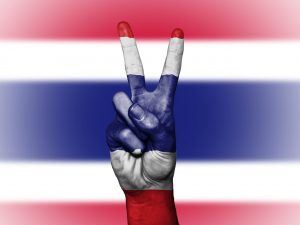Despite agreements on a ceasefire due to the COVID-19 health crisis, conflict in Thailand’s Deep South does not offer much prospect for peace. The Barisan Revolusi Nasional (BRN) insurgent group is unable to uphold their commitments to peace due to deep divisions within their ranks.
Long-running peace talks entered a new phase earlier this year. Both sides appeared committed to jumpstarting the process, after a period of stagnation. On April 4, the BRN, the main separatist group in the area, also unilaterally declared a halt to hostilities on humanitarian grounds, to support “the work of health workers and efforts of the related agencies to control the COVID-19 outbreak.”
The declaration was a rare instance in which the rebels have committed to a de facto ceasefire. Yet this commitment remains ambiguous, pointedly conditional, and hedged with suspicion and mistrust of the state.
For the Thai authorities, a key problem has been not knowing their negotiating partners well. Even though Bangkok conducts peace talks with a range of insurgent groups, which are organiszed under the umbrella of Majlis Syura Pattani or MARA Pattani, the most important negotiations are conducted between Bangkok and the BRN.
But still, the government appears to underestimate the disunity within the Pattani insurgency movement, which will impede efforts for a durable peace deal. Prospects remain dim as long as the various stakeholders are unwilling to compromise on their respective positions.
In Southeast Asia, there is precedent for a crisis creating the necessary conditions to end a long-running separatist conflict. The 2004 Indian Ocean Tsunami that struck Aceh helped to end the low intensity war between Indonesia and the Gerakan Aceh Merdeka (GAM), which ran between 1976 and 2005. While the devastation wrought by the tsunami was critical in providing the enabling environment for peace talks between Jakarta and GAM, there were other important elements that were also present.
These included an Indonesian political and military leadership that was prepared to negotiate with the insurgents, weariness in GAM’s ranks and among the wider public of the conflict, and the preparedness of the international community and mediators to play a role in bringing the conflict to a swift end.
The situations in Pattani and Aceh, however, are dissimilar for a number of reasons. For one, the responses of the Thai state, the security forces, and rebels remain difficult to predict. While recent peace summits have shown promising signs — for example Bangkok recently acceded for the first time to the participation of international observers in talks (a key BRN demand) — the two sides remain far apart in their demands.
There is also the question whether the pandemic in Thailand is severe enough to bring the various players to the negotiating table, much like what happened in Aceh. While the government reported only 91 Pattani residents being infected by COVID-19, the extent of damage caused by COVID-19 is difficult to ascertain due to limitations in testing capacity.
Reports in recent weeks of the resumption of skirmishes between insurgent fighters and the security forces also bode ill for a speedy political resolution. A month after BRN’s announcement of a unilateral ceasefire, the Thai authorities reported intercepting three suicide bombers with links to the rebels. Bangkok also suspects the BRN to be behind the killing of two civilians and two soldiers in a recent shooting attack at a military checkpoint on 3 May 2020.
The Pattani insurgency is fragmented, with BRN leaders having little control over all its militants in the Deep South. Apparent lines of division within the BRN include a young-old ideological schism. Some younger insurgents appear to hold steadfastly to hard-line nationalist sentiments and are unwilling to compromise on their demands for an independent Pattani state.
Additionally, groups like the Gerakan Mujahideen Islamic Pattani (GMIP) and Runda Kumpulan Kecil (RKK), also significant players in the insurgency, espouse Islamist causes, including a desire to establish a caliphate in Pattani. As the RKK and GMIP operate independently of the BRN, and conduct indiscriminate attacks against military and civilian targets, it is unlikely the BRN, acting unilaterally, can uphold a ceasefire commitment.
Signs of growing extremism and radicalization among younger insurgents will harden ideological cleavages further. Reports indicate some youth have taken to sharing Islamic State (IS) propaganda on social media platforms. In September last year, a Thai student from the Deep South was arrested by the Egyptian authorities for the possession of IS content on his mobile device.
But the spread of radical Islam is often downplayed by the authorities and some political observers, who largely frame the Pattani insurgency as an ethno-nationalist movement. The possession of IS content by some individuals is often also attributed to the “curiosity” of youth.
Peace arrangements appear to be more appealing to insurgents during a national crisis. In such scenarios, these groups would hope to extract more concessions from a government that may be besieged by having to deal with a crisis, such as a tsunami or health pandemic.
From this perspective, the current heath crisis offers an opportunity for the Thai authorities and insurgents to strike a favourable peace deal that suits all parties.
But disunity within BRN’s leadership, including between the group’s political and military wings, and between BRN and other insurgent groups such as RKK and GMIP, will be considerable obstacles to overcome.
If the appeal of Islamist narratives strengthens and attracts more radical youth to the insurgency cause, this could potentially aggravate the nationalist-Islamist, ethnic-Islam divide in the Deep South, making a peace settlement all the more elusive in the coming years.
Kenneth Yeo Yaoren is a Research Analyst in the International Centre for Political Violence and Counter Terrorism (ICPVTR), S. Rajaratnam School of International Studies (RSIS), Singapore.
Jasminder Singh is a Senior Analyst in the International Centre for Political Violence and Counter Terrorism (ICPVTR), S. Rajaratnam School of International Studies (RSIS), Singapore.

































